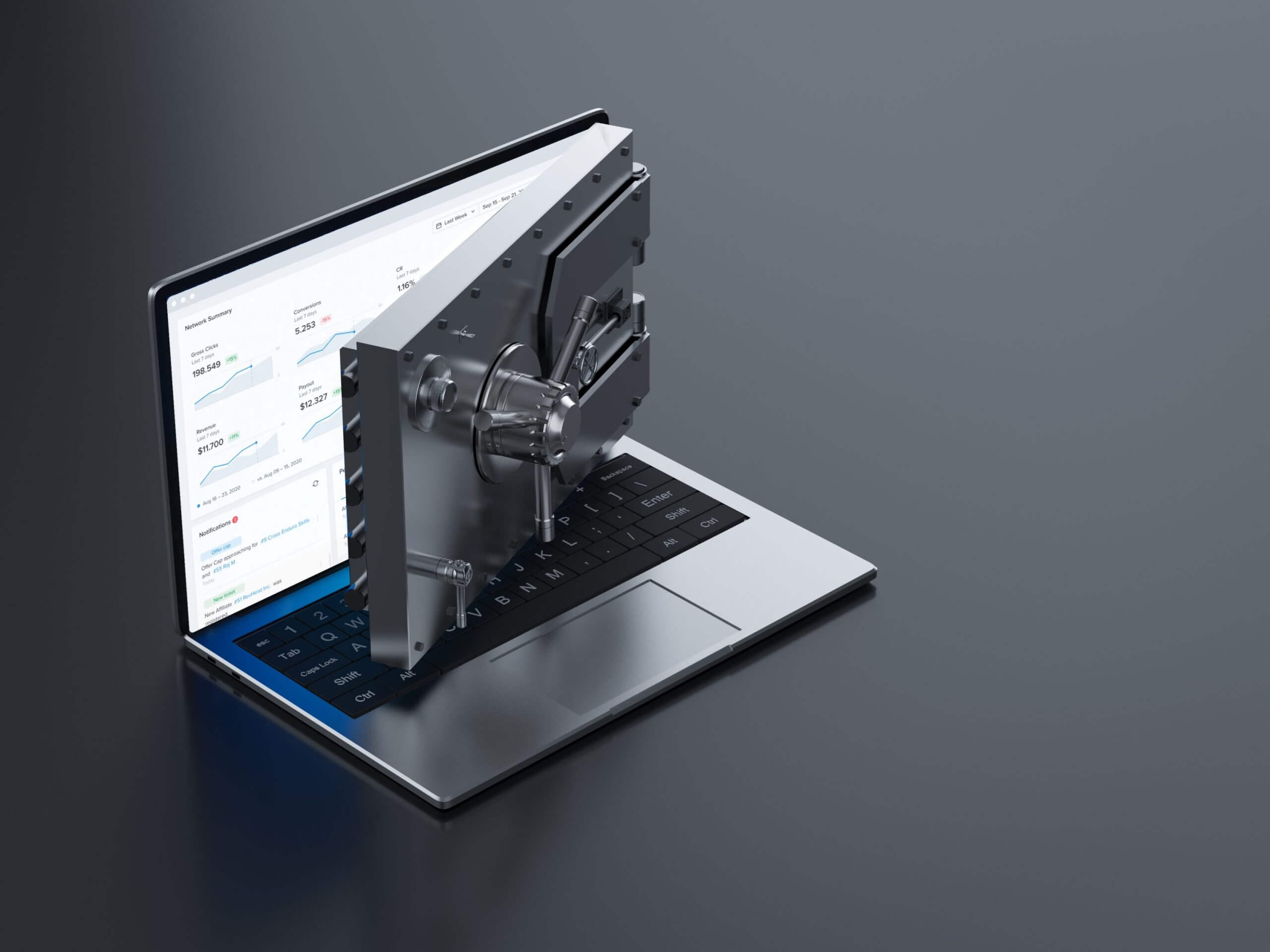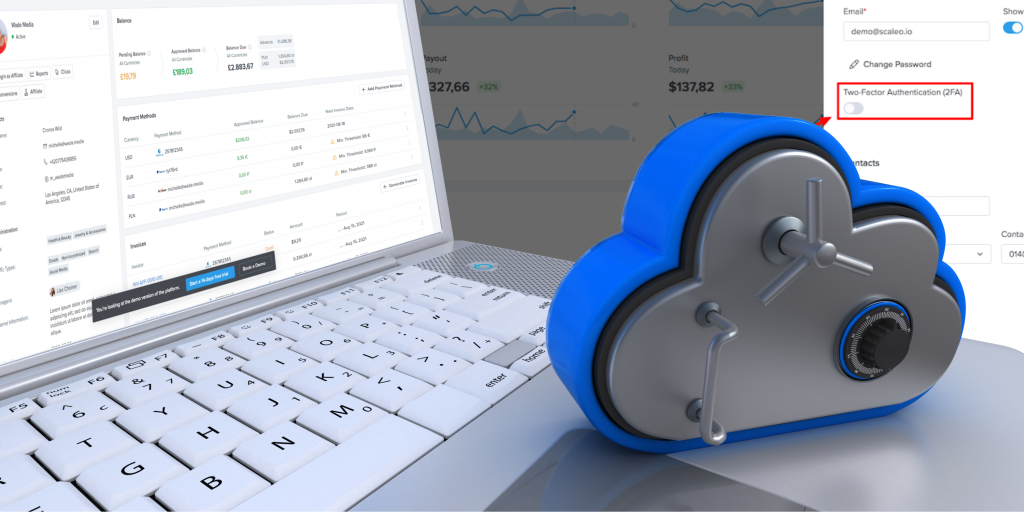Affiliate fraud is everywhere. With the rise of online fraud and cybercrime, ensuring that your affiliate program is secure and not vulnerable to exploits of any kind – is crucial.
In this blog post, we will discuss how to prevent your affiliate program from being exploited and the various ways in which it can be compromised. We will cover topics such as how to monitor affiliate activity and how to protect your program from malicious attacks.

By following these tips, you can ensure that your affiliate program is secure and protected from potential threats.
So, let’s dive in!
What are the most common types of security breaches?
Online cyber security breaches refer to unauthorized access or attacks on systems and networks. These breaches can have serious consequences, including the theft of sensitive information, financial loss, and damage to a company’s reputation.
With the increasing amount of personal and professional data being stored and shared online, it is more important than ever to be aware of the different security threats and how to protect yourself and your company from them.
Some of the most common types of online security breaches include:
- Phishing attacks occur when hackers use fake emails, text messages, and websites to trick people into giving away sensitive information.
- Ransomware attacks happen when hackers take control of a person’s computer or network and demand payment in exchange for restoring access.
- In SQL injection attacks, hackers exploit a website’s database vulnerabilities, generally to steal sensitive information.
- Distributed denial-of-service (DDoS) attacks happen when hackers overload a website’s servers with traffic that the server can no longer handle, to take it offline.
- Advanced persistent threats (APTs). The term refers to hackers who gain unauthorized access to a network and remain undetected for an extended period of time to steal sensitive information.
- Social engineering is where hackers take advantage of the human tendency to trust and manipulate them to gain access to sensitive information.
Understanding how these attacks work and implementing proper security measures can help prevent or mitigate the damage caused by a security breach.
It is worth noting that the above are the most common types of online security breaches. Still, new types of cyberattacks are constantly emerging and evolving; hence, staying vigilant and proactive in protecting yourself and your company online is vitally important.
The Most Popular Type of Affiliate Fraud
Now that we have discussed the various ways your partner program can be compromised, let’s discuss the most well-spread method of “hacking” the program. It’s called: affiliate fraud.
This occurs when the attacker gains unauthorized access to an affiliate program and alters the payout methods of the partners to steal commission and redirect withdrawal payments to their own accounts.
For example, they may change the payout bank account to their own number or add their own BTC wallet number instead of the affiliate’s one. If the attack goes undetected, the manager then rolls out payouts, and unknowingly sends funds to the hackers’ accounts.
This type of fraud can cause significant financial loss for the program and its partners, and hurt the program’s reputation in the long run, if the word spreads out.
This type of fraud can be hard to detect and prevent, but companies can take steps to minimize the risk, such as implementing strong security measures, using robust SaaS, monitoring for suspicious activity, and conducting regular security assessments to identify and address vulnerabilities in the program’s system.
There are different other ways to commit affiliate fraud, like creating fake partners, altering the tracking links, modifying the payout methods, manipulating the sales data, or creating fake sales.
Providing security awareness training to partners can help companies respond quickly and effectively to any instances of affiliate fraud.
While this is the most popular and commonly spread way affiliate programs are suffering, many other ways can be compromised when hackers gain unauthorized access. This includes:
- Upon access to the affiliate program’s database, hackers steal sensitive information, such as customer data and financial information. The most common way is SQL injection attacks to exploit vulnerabilities in the program’s website and gain access to the backend database. They can not only steal sensitive information but also potentially alter the program’s functionality.
- Use phishing email techniques to trick affiliate program members into giving them their login credentials, allowing the hackers to gain unauthorized access to the program and steal sensitive information or, again, replace the payout methods.
- Hackers may also manipulate the affiliate program by altering affiliate links and commissions and redirecting traffic and sales to their own accounts.
The affiliate program needs to have robust security measures in place to prevent these types of breaches.
So, you probably ask…
How to prevent security breaches in a partner program?

Preventing security breaches in a partner program can be a complex task, but there are several steps that companies can take to minimize the risks:
Use Robust Partner Marketing Software
When it comes to security, prevention is always your safest bet.
Building your program using partner marketing software like Scaleo is one of the most effective ways to bulletproof your affiliate program. Scaleo offers multiple layers of security, providing a comprehensive solution to protect your program from cyber threats.
Scaleo’s security layers include:
- Strong two-factor authentication, known as 2FA. This makes it more difficult for unauthorized users to access the program, even if they obtain the partner’s login credentials.
- Email notification when the payout method is modified. By using email notifications, businesses can ensure that all partners are instantly aware of changes to their payout method and are able to update their settings in a timely manner. This is an automated process, meaning that partners will be notified as soon as changes are made, reducing the risk of delays or confusion later.
- Data encryption. This ensures that the data is encrypted by the sender to the intended recipient, providing an additional layer of security for data in transit.
- Regular security updates. Cyber criminals are constantly finding new ways to exploit vulnerabilities and hack into online systems, and our regular software updates help shield our users from these new techniques and vulnerabilities.
- Bad traffic blocking. Scaleo automatically monitors all incoming traffic and has a system to detect and alert suspicious activity and bot or low-quality traffic.

All of these layers work together to help protect your program from unauthorized access and data theft.
Implement Strong Authentication
Requiring more than one step in order to log into the system makes it more difficult for unauthorized users to access the program.
Implementing double authentication can help prevent affiliate security breaches in several ways. Here are a few ideas:
- 2FA or multi-factor authentication: This requires users to provide two or more forms of identification, such as a password, a fingerprint, or a one-time code sent to a mobile device or email, to access an affiliate account.
- Single Sign-On (SSO) solution: This allows partners to use one set of credentials to access multiple systems and applications, reducing the risk of password reuse and making it easier to manage access.
- User-behavior-based authentication: This uses machine learning algorithms to learn the behavior patterns of each user, such as typing speed, mouse movement, and other biometric data, to identify fraudulent or suspicious access attempts. Any unusual pattern of activity then gets flagged.
- IP whitelisting: This allows access to the affiliate program only from specific IP addresses, which can prevent unauthorized access attempts from outside the company. Companies may also choose to blacklist certain IP addresses to prevent unauthorized access.
By implementing robust authentication methods, companies can make it much more difficult for unauthorized users to gain access to their affiliate programs. Make sure you also limit access to the affiliate program based on a user’s role and responsibilities, minimazing the risk of partners having more access than they need.
It can help companies detect and prevent affiliate fraud as it can be easier to identify when a user is not who they claim to be.
Use encryption
Always encrypt sensitive data stored in the program, such as customer information and financial data, to protect it from being stolen in the event of a cyber security breach. Encryption protects data by converting it into unreadable code for unauthorized users. It can effectively prevent someone from hacking into an affiliate program and stealing sensitive information.
Here are a few ways to use encryption to avoid affiliate program hacking:
- Encrypt sensitive data: This will make it much more difficult for hackers to access and steal this information, even if they are able to gain unauthorized access to the program. Any data stored in the affiliate program, such as customer information and financial data, should be encrypted.
- Use Secure Socket Layer (SSL) or Transport Layer Security (TLS) certificates: Of course, today using an SSL certificate is a standard security measure, and there are many certificates available, from the most basic to the most powerful ones. What SSL and TSL do is encrypt the data being transmitted between the program and its partners, making it much more difficult for hackers to intercept and steal this information in transit.
By using encryption, companies can protect sensitive data stored in their affiliate program, making it much more difficult for hackers to steal this information and use it for malicious purposes. Encryption can also help companies prevent data leakage, ensuring that the data remains confidential even if it falls into the wrong hands.
Regular software updates
Software becomes outdated over time, sometimes faster than you think. By updating the software, companies can reduce the risk of software becoming obsolete and vulnerable to known exploits. Keep all plugins and software used in the program up to date with the latest security patches because they always protect against the most recent known cyber threats. Regularly updating the software that runs the affiliate program can help prevent security breaches for several reasons:
- Fix known vulnerabilities: Software updates often include patches for known vulnerabilities in the software scripts. Frequent updates ensure that these vulnerabilities are fixed, reducing the risk of a security breach.
- Adding new security features: Software updates may also include new features that improve the overall security of the affiliate program. For example, a new update may offer 2FA, the option to login using a fingerprint, or logging in through a third-party account, such as Facebook, Apple ID, or Google.
- Stay compliant: Regulations and industry standards change, and software updates may be necessary to ensure the affiliate program is compliant with these changes.
Regularly updating the software can help companies stay ahead of hackers and avoid a build-up of security vulnerabilities. You should also conduct security assessments to identify and address vulnerabilities in the program’s backend and administration processes.
Provide security awareness and training to partners
Providing security awareness and training to partners is essential in protecting their accounts against being exploited.
Here are a few reasons why:
- Partners are a common point of entry for hackers: Partners have access to the affiliate program and its system, which makes them a common point of entry for hackers and the easiest entry point for gaining access to affiliate payouts.
- Partners may not be aware of the risks: Even to this day, partners may not be aware of certain risks associated with working in an affiliate program and may not know how to protect themselves and the program from security breaches. Companies can educate partners on identifying and preventing potential threats by providing cyber security awareness and training. Also, partners may not be aware of best practices for working with an affiliate program and may not know how to protect sensitive information, or even undervalue the importance of it.
- Partners may not have the same security practices: Partners may have different security practices and may be used to not being as careful.
By encouraging security awareness and training, companies can show partners that they take security seriously and are committed to protecting sensitive information, which can help build trust between the company and its partners.
Monitor for suspicious activity
Unless your partner tracking software already has this inbuilt (like Scaleo does), implementing monitoring systems to detect and alert suspicious activity is important. This includes login attempts from unfamiliar locations, new devices, or unauthorized program data changes.
Here are a few ideas you can implement to monitor your partner program for suspicious activity:
- Use machine learning and AI-based monitoring: Machine learning algorithms can be used to analyze patterns of activity and identify suspicious behavior, such as abnormal login patterns or changes in the way the system is being used to.
- Monitor financial transactions: Keeping an eye on financial transactions can help identify suspicious activity, such as large or unusual transactions or transactions that deviate from standard patterns.
- Use user behavior analytics: User behavior analytics can help identify abnormal behavior by individual partners, such as an unusual number of logins, too many failed logins, or a sudden mass change of payout methods. For example, if dozens of partners logged in to their accounts to change their payout method, it should raise a red flag.
- Monitor third-party access: Regularly review and monitor access given to third-party vendors and revoke access for those who no longer require it.
Overall, regularly perform security audits to identify vulnerabilities and check for any unauthorized changes or access attempts. Suspicious activity may vary from program to program, depending on their pool of partners and size. Naturally, it’s a lot easier to detect abnormal activity in smaller programs that are not too busy, but the bigger the partner program is, the more hackers it will attract, so learning user patterns is essential anyway.
Limit access to sensitive data
Limit access to sensitive data on a need-to-know basis and regularly review and revoke access for former employees and partners who no longer require it. By limiting access to data in an affiliate program, companies can reduce the risk of sensitive information falling into the wrong hands and protect it from security threats.
As we mentioned earlier, you can also limit access to the affiliate program based on a user’s role and responsibilities.
By taking these steps, companies can help protect their partner program and the sensitive information it contains from security breaches.
Conclusion – What layers of security to implement?
Security breaches and cyber security attacks on partner programs can have serious consequences, including the theft of sensitive information, financial loss, and damage to a company’s reputation.
To avoid this, it is important to implement robust security measures, such as using robust SaaS partner marketing software to power your program, using strong authentication methods, encryption, regular software updates, security awareness training for partners, and monitoring for suspicious activity.
Implementing theft detection systems, network traffic monitoring, keeping an eye on logs, using machine learning and AI-based monitoring, monitoring financial transactions, using user behavior analytics, monitoring third-party access, and performing regular security audits can help companies gain a comprehensive understanding of the activity on their affiliate program and take action to protect it from cyber-attacks.
Having an incident response plan in place can also help companies respond quickly and effectively to a security breach once one occurs.
Looking for a robust partner program Software?
Looking for robust partner software to help you manage and grow your business? Scaleo is a powerful partner software that can take your business to the next level.
With advanced security features, including two-factor authentication, encryption, traffic blocking and flagging, and regular updates, Scaleo offers multiple levels of affiliate protection to keep your data and your business safe.
Start your 14-day free trial today and bulletproof your program!

Last Updated on January 2, 2024







